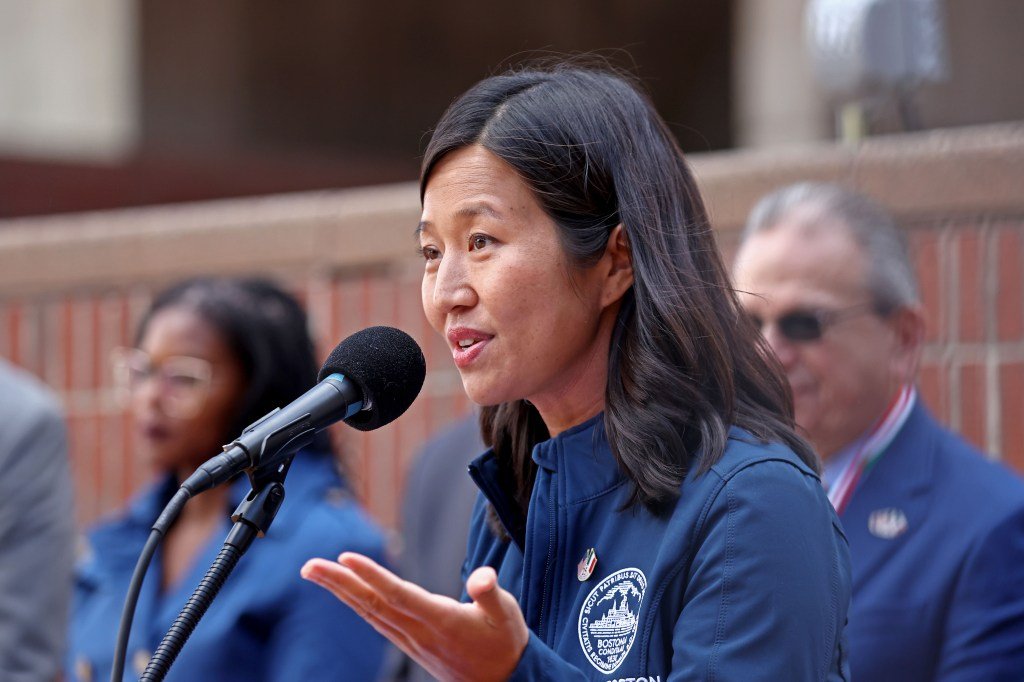Boston Mayor Michelle Wu’s unwillingness to compromise on cuts to the city’s $4.6 billion budget has been a sticking point in private talks she’s had with the Senate about her stalled plan to hike commercial tax rates, the Herald has learned.
The Massachusetts Senate is interested in a compromise and the compromise highlighted has involved cuts to Boston’s budget, which grew by 8% this fiscal year. Wu has not been eager to compromise on that front, the Herald was told.
Whether a potential deal hinges on cuts being made to Boston’s budget remains unclear. Senate President Karen Spilka’s office declined to comment on the matter on Thursday, citing private discussions.
Spilka’s office also declined to comment on a statement made by Boston City Councilor Brian Worrell at the outset of a Council committee hearing that focused on alternatives to the mayor’s tax plan, in terms of what Worrell was told about another point of compromise the mayor and Senate may be discussing.
Worrell said it was his understanding that there might be a “185% offer on the table in the Senate,” in terms of a lower maximum tax shift from the residential to commercial sector than the 190% cap the mayor and House leadership agreed to when the legislation was passed by that chamber in late July.
Wu’s initial home rule petition had called for giving the city the authority to increase the maximum shift allowed by state law, from 175% to 200%, for a period of five years. The deal the mayor struck with ally Aaron Michlewitz, the House’s budget chief, by way of an executive order she agreed to sign should the bill pass the Legislature, would lower the length of the proposal, to three years.
“As someone who voted against the property tax shift in June because I thought the 200% was too high, and as someone who thought the 190% was a better number, I urge the sides to reach that compromise on that 185%,” Worrell, who chaired the day’s Council Ways and Means Committee hearing, said.
The latest insight into the closed-door negotiations regarding the mayor’s stalled legislation — which would allow the city to shift more of its tax burden onto commercial properties beyond what’s allowed by state law — comes as Wu is putting public pressure on the Senate to act on her plan by late November.
The mayor and Senate president traded jabs publicly when the city’s tax plan failed to come to a vote in that chamber by the end of formal legislative sessions, and it seems budget cuts are the latest sticking point impeding consensus.
Wu sent a letter to the City Council Tuesday, stating that her administration opposes alternatives that have been floated by critics of her tax plan, including cuts to the city’s $4.6 billion budget, and “rebate” approach that was the subject of a Council hearing on Thursday and has been dismissed by the mayor as “illegal.”
In the letter, Wu presented a hypothetical scenario where a 1% budget cut, as suggested as an alternative approach by the Boston Municipal Research Bureau, would result in a $46.4 million reduction to key public safety and other city services. That cut would cancel Boston Police, Fire and EMS Academy classes and pause planned hiring at three of the city’s largest core departments, Wu wrote.
The mayor’s budget analysis was challenged by an attendee at a Wednesday night town hall meeting in West Roxbury, where Wu urged residents to lobby their senators to pass the legislation — which her administration’s latest assessment estimates show would reduce next year’s quarterly tax hike for the average single-family homeowner from 27.8% to 9.9%.
West Roxbury resident Stephen Morris, citing a city budget that he says has grown by nearly $1 billion since the mayor took office, said he found it “hard to believe” that the Wu administration “can’t find any budget cuts.”
“We need to start having some fiscal conservancy,” Morris said. “All I hear is tax and spend … where does it end? When are we going to start using some common sense?”
Morris told the Herald that while the mayor’s letter laid out potential cuts to public safety and core city services, Wu could instead look to tighten up spending for duplicative departments and department heads, and ease off on investments in services and initiatives that don’t have a broad reach, such as bike lanes.
The Herald published a report on city payroll data earlier this year, showing there are 66 people in the mayor’s office making a total of $5.2 million. Eighteen of those staffers are making north of $100,000, the data show.
Various cabinet chiefs are collectively making nearly $2.5 million in salaries, the data show.
At the town meeting, Wu responded directly to criticism raised by Morris about the budget, saying, “Cutting department heads or cutting staff — that has a huge impact. I know it can seem like just numbers on a page.”
As mayor, Wu said she’s learned that while “you can force” a new program to start, “whether it continues to be high quality, whether residents can depend on it over time, that depends entirely on the workforce being supported,” through resources such as salaries, cost of living adjustments, and the management they report to.
At the community meeting, Wu continued to press for her tax plan as being the best option to provide relief to homeowners.
Her administration has estimated that to account for the projected commercial tax revenue shortfall brought on by declining property values and vacant office buildings, the city would need to cut $265 million from the budget, which would mean the city would have to lay off about 2,200 employees, the mayor has said.
The mayor’s plan has garnered support from the city’s fire and largest police unions, with the respective union heads, Sam Dillon and Larry Calderone, testifying Thursday that their members live in the city and would feel the burden of a residential tax hike.
Originally Published:




